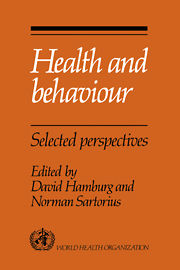Book contents
- Frontmatter
- Contents
- List of contributors
- Preface
- Acknowledgements
- List of abbreviations
- 1 Social and behavioural determinants of mental disorders
- 2 Food-related behaviour
- 3 The psychosocial environment and the development of competence in children
- 4 Children in danger
- 5 Adolescent health care and disease prevention in the Americas
- 6 Social networks and mental disorder (with special reference to the elderly)
- 7 Mental health aspects of general health care
- 8 The sociology of health care in developing countries
- 9 Population movements and health: global research needs
- 10 Health and behaviour: a worldwide perspective
- Index
10 - Health and behaviour: a worldwide perspective
Published online by Cambridge University Press: 06 August 2010
- Frontmatter
- Contents
- List of contributors
- Preface
- Acknowledgements
- List of abbreviations
- 1 Social and behavioural determinants of mental disorders
- 2 Food-related behaviour
- 3 The psychosocial environment and the development of competence in children
- 4 Children in danger
- 5 Adolescent health care and disease prevention in the Americas
- 6 Social networks and mental disorder (with special reference to the elderly)
- 7 Mental health aspects of general health care
- 8 The sociology of health care in developing countries
- 9 Population movements and health: global research needs
- 10 Health and behaviour: a worldwide perspective
- Index
Summary
The health of the world is much more closely related to behaviour than we understood even a decade ago. Modern science and technology have made powerful contributions to knowledge of how to meet the basic adaptive needs for food, water, shelter, and other essentials for survival and reproduction. Yet we have been killing ourselves: inadvertently for the most part, knowingly to some extent, and regretfully – but killing ourselves none the less.
The heaviest burden of illness today is related to individual and group behaviour. It is reliably estimated that, in the United States, 50% of mortality from the ten leading causes of death can be traced to behaviour such as smoking, drinking, and eating inappropriate foods. Numerous other behaviours are also highly relevant to health and disease, both mental and physical, of the individual and those around him (e.g. violence and suicide).
The health problems of the developing world are no less related to behaviour, involved not only in mental illness but also in nutrition, sanitation, family planning, and accident prevention. The life-style factors identified as relevant in developed countries also affect developing countries. For example, smoking, which is a major cause of both cardiovascular disease and cancer and a contributor to many other chronic illnesses, and alcohol use and abuse, which are directly or indirectly involved in a number of illnesses and impairments, are on the rise in developing countries; they both dramatically illustrate how significant the contribution of behaviour is to the modern burden of illness.
Keywords
- Type
- Chapter
- Information
- Health and BehaviourSelected Perspectives, pp. 206 - 220Publisher: Cambridge University PressPrint publication year: 1989
- 1
- Cited by

